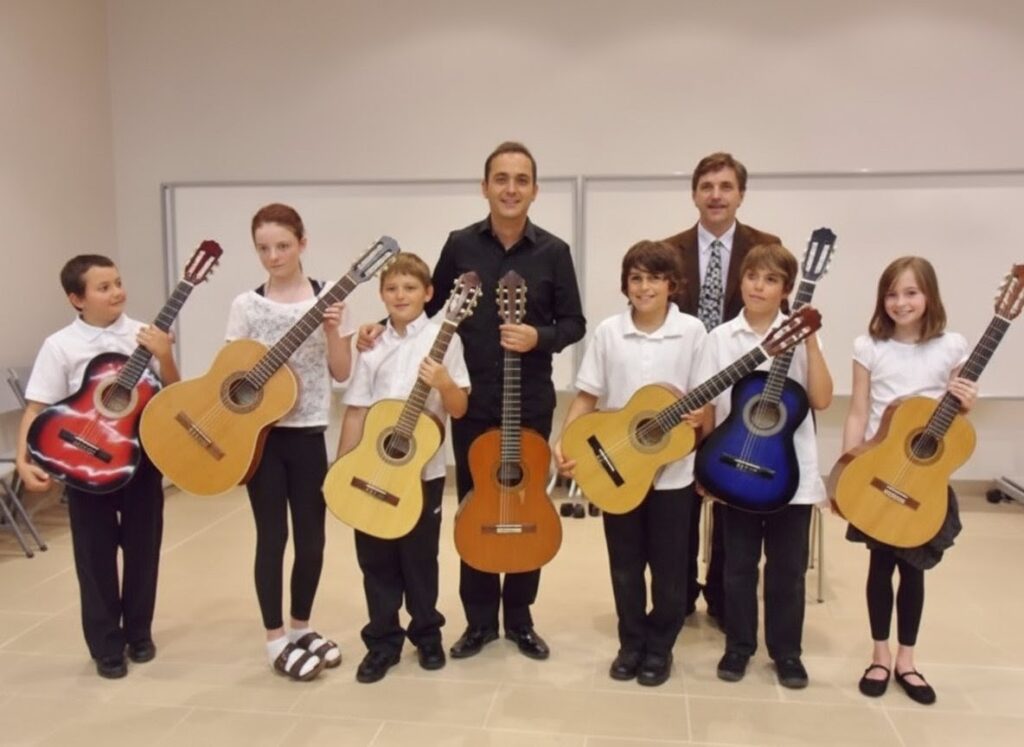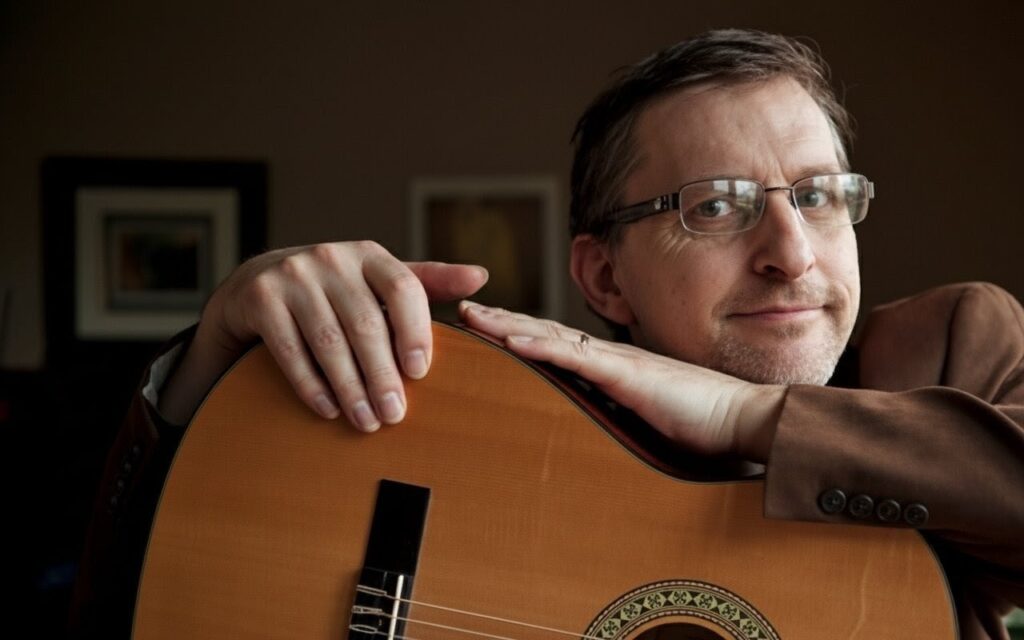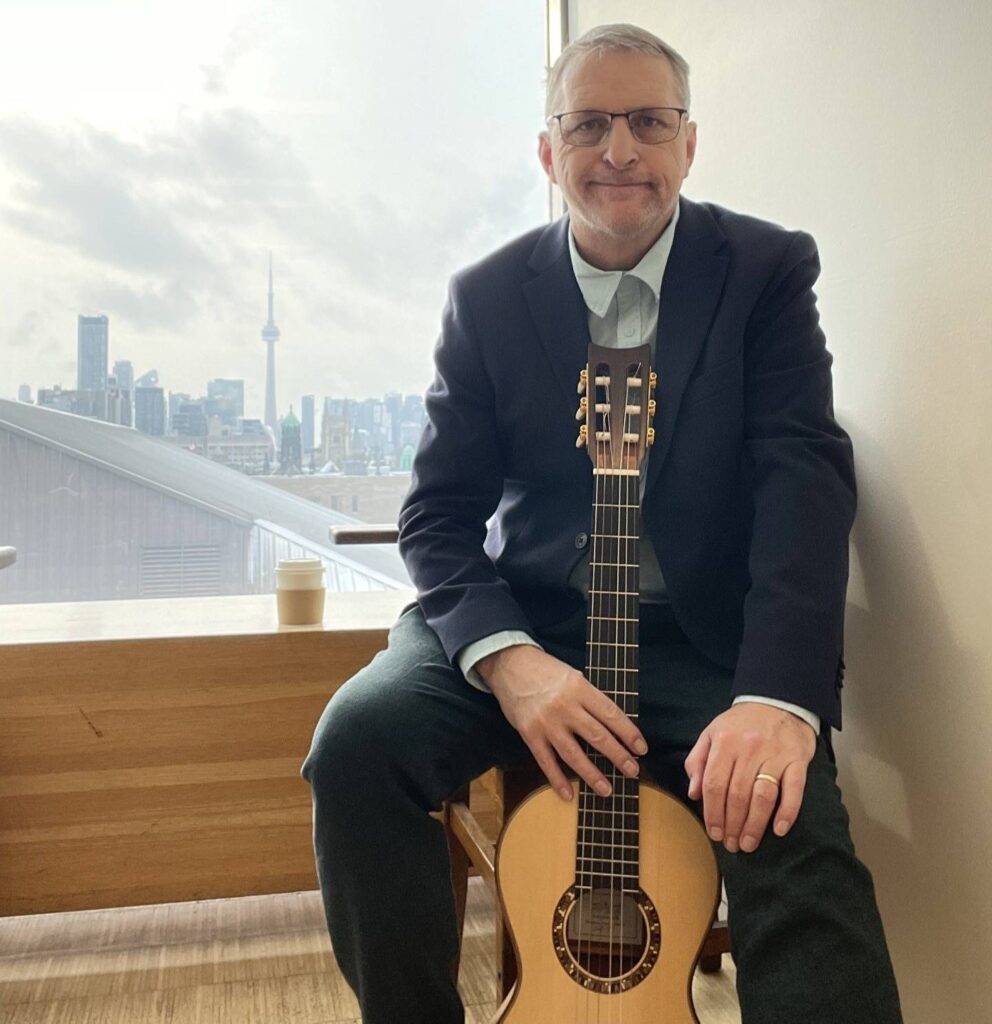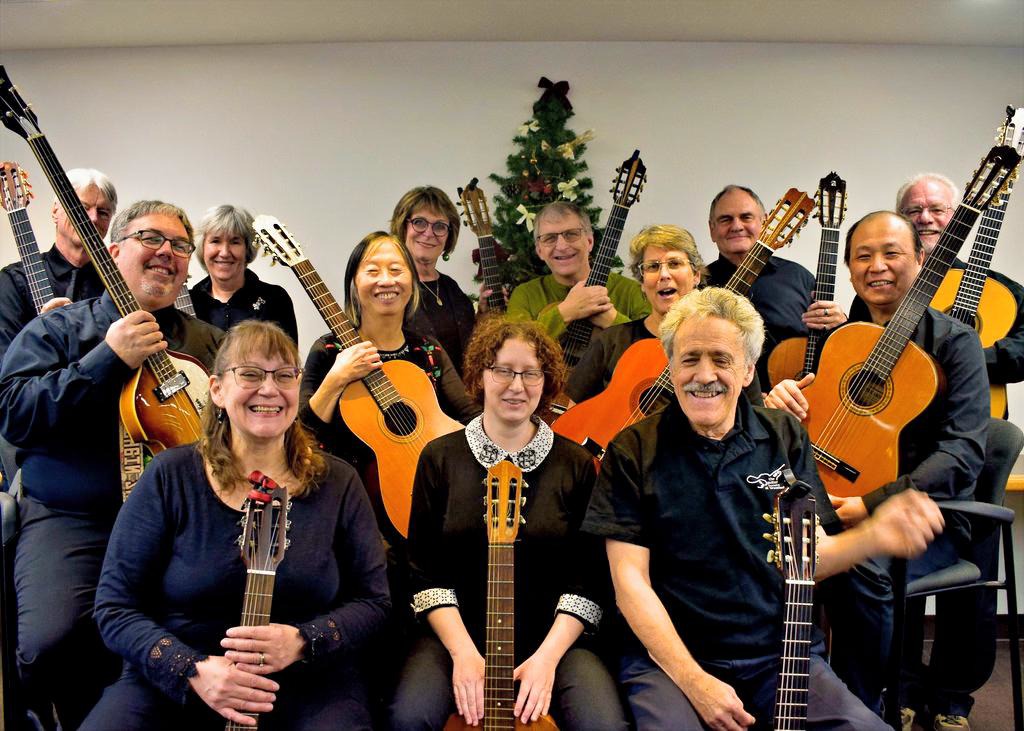Since founding the Guitar Society of Brantford in 2011, Dr. Patrick Feely, who is also the artistic director, has been focused on providing programs for instruction, as well as events that showcase members and bring world-class talent at a variety of live performances.
Feely, who is a veteran guitar instructor as well as an Assistant Professor (Music Education) at the University of Western Ontario, explained the beginnings for the society.
“I had a lot of private students at that time. I was looking for a way for them to connect with each other—I wanted them to be playing in ensembles, not just solo guitar in lessons. I wanted a social connection for them, because I think learning in a social environment is critical, not just in your practice room. So, that was one of the impetuses. Another reason was to bring some world-class performers into the community so the students could hear them. And doing that…opened the door to the larger community in Brantford. If there are concerts, we obviously open those up to the larger Brantford and Brant County area for everyone to come and hear them,” he said. “We [also] had the students playing before the international concert series. We wanted local kids to play one or two short pieces before those international concerts, which were generally at Glenhyrst Art Gallery. We ended up having sort of three concert series: we had the local students, including adults, and we had the paraprofessionals, with whom we partner with my long-term instructor, Jeffrey McFadden [who is Chair of Guitar Studies at the University of Toronto] at the University of Toronto and other universities.”
However, the society has offered many opportunities for people to join and participate in various programs.
“We bring in doctoral students from universities to perform free concerts in town, and the library has been a real staple for that. We also have the international concert series [and later] opened up the ensembles to the general public, moving beyond just my private students. We found a lot of interest from adults, who seemed to fall into two groups. One group consisted of guitarists who had played seriously when they were younger—perhaps they had aspired to be professionals or had done some schooling, but then life and their careers, and family became the focus, and their guitar was put in the closet,” the instructor noted. “These people joined the Community Guitar Orchestra, which I lead. Our ultimate goal was to bring guitar music to the wider community, [while] connecting with people at all stages of their life, [and to] make high-level performance accessible locally, and foster community engagement.”

Feely also has been a proponent of utilizing the Suzuki method when it comes to teaching guitar to his students.
“I think it was a little bit of an early childhood education thing for music. I work with kids starting around five or six years old, though some people start earlier. The parents are very much involved: they sit in on the lessons, learn to hold the guitar, take notes, and help set up and oversee the educational environment at home. It’s not really reasonable to expect a five- or six-year-old to manage all that by themselves. The parents are a critical part of what we call the Suzuki triangle [involving] the parent, the student, and the teacher. Successful learning is thought to happen when that triangle is very strong and robust,” Feely said. “It’s also about learning music by listening first. In the beginning, there is no reading of music, because the philosophy is that people learn language not through symbol systems, but by listening to conversations; the natural way children learn. You learn by listening and imitating, and then later, after you can speak the language, you learn to read and write. Suzuki follows that trajectory: students have recordings of the pieces they are learning, and they listen to them to get the music in their head and hear what the pieces sound like.”
Feely continued on the advantages of the Suzuki method to all involved, including parents and their children.
“It’s a very structured program, and it involves games. Kids really take to games, so we play some that revolve around repetition. For instance, we use a racetrack game where students move their car ahead when they play something correctly, and my car might move back if I play something wrong. It’s a fun, competitive dynamic that they respond well to,” the educator explained. “The program is about building discipline, confidence, and connection with family. I always found it great how involved I was helping my daughter set up her piano routine at home. So, the focus is on early childhood learning by ear first, the family connection (the triangle), and building confidence. It seems to be a very successful program.”

However, Feely and the society have continued to gain support from the community
“The Brant County Library has been very helpful and supportive. We are running a free Suzuki program at the Paris Public Library starting in October. It’s capped at around ten students to keep it manageable as we launch the program. I’ll be facilitating the program with the youngsters, teaching them the fundamentals: how to hold the instrument, proper fingering, positioning, and hand movement. As mentioned, the parents will be learning alongside their kids. It’s important for them to understand what their children are negotiating—it’s tough to learn any instrument. By learning themselves, parents can both reinforce the lessons and empathize with the challenges of learning, which takes time and can be frustrating,” he maintained.
The Society has also brought some top tier performances to play in the city, helping strengthen the appeal of guitar playing in the community.
“We’ve hosted top performers from every corner of the planet—including from Europe, and South America. We were able to do this by partnering with our peers and colleagues at the Guitar Society of Toronto, which I believe is the oldest guitar society internationally. Because it’s in Toronto, they have a much more international focus and can afford to bring over these artists, “Feely said. “We essentially piggyback on their schedule. Since Toronto isn’t far, we can ‘parachute’ those performers into our environment here, perhaps on a Friday evening before their Saturday Toronto concert, or on a Sunday afternoon after it. This is how we’ve been able to access the cream of the crop of international performers.”
Feely continued, “The concerts have been very well-received and the venue is always packed. [Although] COVID threw a wrench for a time, we’re regrouping now…[and] always make sure a younger community player performs before these concerts…giving them a profile. It’s been incredibly rewarding to see that many of those students have gone on to complete undergraduate and master’s degrees in performance and music in Canada and Europe. For instance, one former student graduated with a Master’s from McGill, while others have studied in the States and the Netherlands. It’s great to see that success.”

Nevertheless, Feely reflected on some other highlights over the years.
“Thinking back, one of our main events was a weekend festival we held in the 2000s. The primary focus was our community guitar orchestras. We brought in clinicians from Europe, the United States, and across Canada to work with the orchestras over the course of the weekend. The event culminated in a concert featuring the ensembles…we were even able to get the composer of one of our major works, Jan Bartlema, who hails from the Netherlands, to come in, rehearse, and conduct the piece. That weekend was a wonderful experience…with additional concerts by the visiting artists and fabulous solo and duo performers from Italy and South America. Selling out those events and introducing the local community to that caliber of artistry has always been a real rush,” he said. “Beyond the festivals, we’ve watched our local members grow over the years, developing their abilities to play in the orchestra and give concerts. It’s rewarding to see them build confidence and make social connections through music. I think for instruments like the guitar or piano, lessons can be pretty solitary, particularly when you’re not doing popular music. Our focus is more on classical guitar, even when we incorporate popular elements. It’s the social connection that helps people grow musically.”
As the society approaches its 15th anniversary, Feely is looking forward to developing unique programs to connect people in the community.
“One thing that has grown out of the period around COVID, and what we’re looking forward to doing moving forward, is creating a hybrid program. I taught an asynchronous program at the University of Western Ontario, and I’m using that model to create an online course. The idea is to reach people who can’t attend in person, like seniors who may not have transportation…it combines an online asynchronous course with bi-weekly in-person group practice sessions. Crucially, those unable to attend the rehearsal can still participate by Zooming in. We plan to begin a beta test this fall, and interested individuals are welcome to contact us,” Feely stated. “Simultaneously, we are continuing to push the Suzuki program for our youngest students. We are putting the International Concert Series together is a big undertaking with limited resources, so we are currently focused on successfully hosting at least one or two high-caliber concerts annually. Additionally, we have two performances by the paraprofessionals scheduled and the Community Guitar Orchestra’s regular summer and winter concerts at the Brantford Public Library.”
